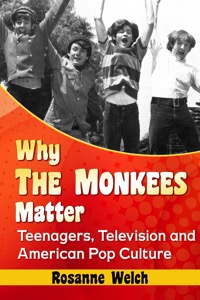Rosanne Welch talks about “Why The Monkees Matter” with Jean Hopkins Power
Watch this entire presentation (45 mins)
Jean Powergirl takes the host reigns and welcomes her guest Rosanne Welch, PhD to the show! They’ll be discussing Roseanne’s book, “Why The Monkees Matter: Teenagers, Television and American Pop Culture.”
Transcript:
Jean: So let’s talk about the individual Monkees, all right. Again, here they are again. So tell us — who is this guy right here.
Rosanne: On the end there you see Michael Nesmith. he was from Texas and had come to Los Angeles to be a rock and roll singer. He hosted at a couple of clubs in town. He would host open mic nights and whatnot for local rock bands and he had written Different Drum which is the song Linda Ronstadt msde famous. So he was looking for a job and a career as a singer-songwriter.
Jean: …and already had the talent obviously.
Rosanne: Exactly….when the audition came up and basically hey, who doesn’t want extra cash. So he auditioned and he was cast.
A hit television show about a fictitious rock band, The Monkees (1966-1968) earned two Emmys–Outstanding Comedy Series and Outstanding Directorial Achievement in Comedy. Capitalizing on the show’s success, the actual band formed by the actors, at their peak, sold more albums than The Beatles and The Rolling Stones combined and set the stage for other musical TV characters from The Partridge Family to Hannah Montana. In the late 1980s, the Monkees began a series of reunion tours that continued into their 50th anniversary.
This book tells the story of The Monkees and how the show changed television, introducing a new generation to the fourth-wall-breaking slapstick created by Laurel and Hardy and the Marx Brothers. Its creators contributed to the innovative film and television of 1970s with projects like Bob & Carol & Ted & Alice, The Mary Tyler Moore Show, Laugh-In and Welcome Back, Kotter. Immense profits from the show, its music and its merchandising funded the producers’ move into films such as Head, Easy Rider and Five Easy Pieces.
Rosanne Welch, PhD has written for television (Touched by an Angel, Picket Fences) and print (Three Ring Circus: How Real Couples Balance Marriage, Work and Kids and The Encyclopedia of Women in Aviation and Space). In the documentary world she has written and produced Bill Clinton and the Boys Nation Class of 1963 for ABC NEWS/Nightline and consulted on PBS’s A Prince Among Slaves, the story of a prince from West Africa who was enslaved in the 1780s, freed by order of President John Quincy Adams in the 1820s and returned to his homeland.
Podcast: Play in new window | Download
Subscribe: RSS
![13 : Michael Nesmith and The Monkees : “Why The Monkees Matter” Interview with Jean Power [Video] (0:35)](https://rosannewelch.com/wp-content/uploads/2017/07/rmw-power-13-nesmith.jpeg)

![Conclusion and Acknowledgements from Why The Monkees Matter Book Signing [Video] (1:48)](https://rosannewelch.com/wp-content/uploads/2017/07/wtmm-reading-16-conclusion.jpeg)

![12 : Women and The Monkees : “Why The Monkees Matter” Interview with Jean Power [Video] (1:04)](https://rosannewelch.com/wp-content/uploads/2017/07/rmw-power-12-women.jpeg)

![Personal Identity and The Monkees from Why The Monkees Matter Book Signing [Video] (0:37)](https://rosannewelch.com/wp-content/uploads/2017/07/wtmm-reading-15-identity.jpeg)
![11 : Feminism and The Monkees : “Why The Monkees Matter” Interview with Jean Power [Video] (0:53)](https://rosannewelch.com/wp-content/uploads/2017/07/rmw-power-11-feminism.jpeg)
![Characters vs. Actors and The Monkees from Why The Monkees Matter Book Signing [Video] (1:10)](https://rosannewelch.com/wp-content/uploads/2017/07/wtmm-reading-14-characters-actors.jpeg)
![10 : Writers and The Monkees : “Why The Monkees Matter” Interview with Jean Power [Video] (0:44)](https://rosannewelch.com/wp-content/uploads/2017/07/rmw-power-10-writers.jpeg)
![Commentary, Comedy, and The Monkees from Why The Monkees Matter Book Signing [Video] (1:01)](https://rosannewelch.com/wp-content/uploads/2017/07/wtmm-reading-13-commentary.jpeg)
![09 : Only 2 Seasons : “Why The Monkees Matter” Interview with Jean Power [Video] (1:11)](https://rosannewelch.com/wp-content/uploads/2017/06/rmw-power-09-only-2-seasons.jpeg)